Simple Habits Save Water
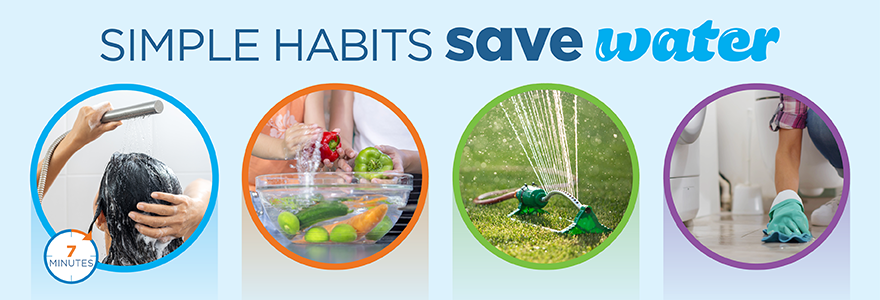
It’s easy to reduce water use at home. Applying these tips can help reduce water use and keep costs down.
 In the Bathroom
In the Bathroom
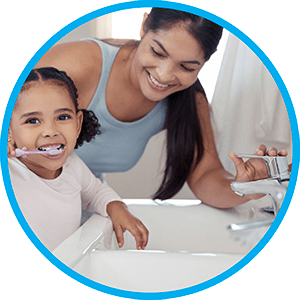 Turn off the faucet while shaving, brushing your teeth and washing your hands and face.
Turn off the faucet while shaving, brushing your teeth and washing your hands and face.- Take short (7-minute) showers.
- Turn the water off while you shampoo and condition your hair — you can save more than 175 litres a week.
- Install aerators with flow restrictors on all faucets.
- Install low-flow showerheads.
- Install low-flush toilets.
- Check for leaks from sinks and toilets.
- Reuse towels after showering.
 In the Kitchen
In the Kitchen
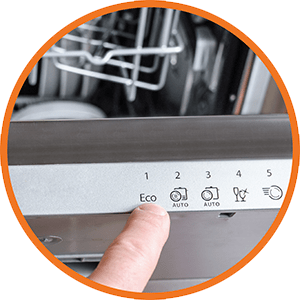 Fill the sink with wash water when washing dishes by hand. Do not let the water run continuously.
Fill the sink with wash water when washing dishes by hand. Do not let the water run continuously.- Wash produce in the sink or a bowl filled with water instead of running water from the tap.
- Collect the water used to rinse produce and re-use it to water plants.
- Keep a pitcher of water in the refrigerator instead of running the tap for cold drinks.
- Use a bucket for regular household cleaning instead of running water.
- Check for leaks from dishwasher and sinks.
- Select “eco” or “quick wash” settings on dishwasher.
- Wait for a full load to run the dishwasher. (Running dishwasher and washing machine only with full loads can save up to 3,700 litres per month.)
 In the Yard
In the Yard
For your lawn:
- Follow lawn watering regulations and water the lawn early in the morning to minimize evaporation.
- Check your sprinkler placement to ensure water is not wasted on sidewalks, driveways or other non-required areas.
- Install a rain shut-off device on automatic sprinklers to eliminate unnecessary watering.
- Weed lawn regularly because weeds compete for water.
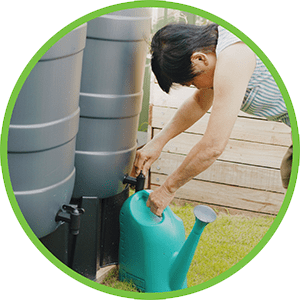 Use a layer of organic mulch around plants to reduce evaporation.
Use a layer of organic mulch around plants to reduce evaporation.- Use a nozzle on your hose and only water plants when necessary.
- Direct downspouts and other runoff towards shrubs and trees.
- Use a rain barrel to collect water for use in your garden or washing outside surfaces. (Barrels are available for Richmond residents to purchase as a subsidized price. See Rain Barrel Program for more information.)
- Weed garden regularly because weeds compete with other plants for water.
- Apply the minimum amount of fertilizer needed as they increase water consumption.
- Choose low-water plants for year-round landscape colour and save up to 2,000 litres per year.
- Check outdoor faucets, pipes and hoses for leaks.
- Check hot tubs and pools for leaks.
- Use a bucket, along with a sponge and hose nozzle to wash your vehicle to save about 300 litres per wash.
- Use a broom instead of a hose to clean your driveway or sidewalk to save 300 litres of water each time.
- Do not use recreational water toys that require a constant flow of water.
 In the Laundry Room
In the Laundry Room
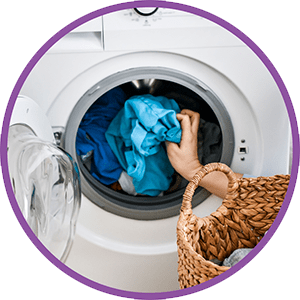 Run the washing machine only with full loads. (Running dishwasher and washing machine only with full loads can save up to 3,700 litres per month.)
Run the washing machine only with full loads. (Running dishwasher and washing machine only with full loads can save up to 3,700 litres per month.)- Match the water level to the size of the load when doing laundry.
- When replacing washing machine, look for water-saving options.
- Check for links from washing machine and sinks.
 Track Usage & Leaks
Track Usage & Leaks
- Check your quarterly water bill to track usage and get a feel for the impact of consumption habits.
- Know where your master water shut-off valve is located. This could save litres of water and damage to your home if a pipe were to burst.
- Learn how to read your water meter so you can monitor your water consumption and spot sudden increases in usage, which may indicate a leak.
- For more information, see Water Meters.


